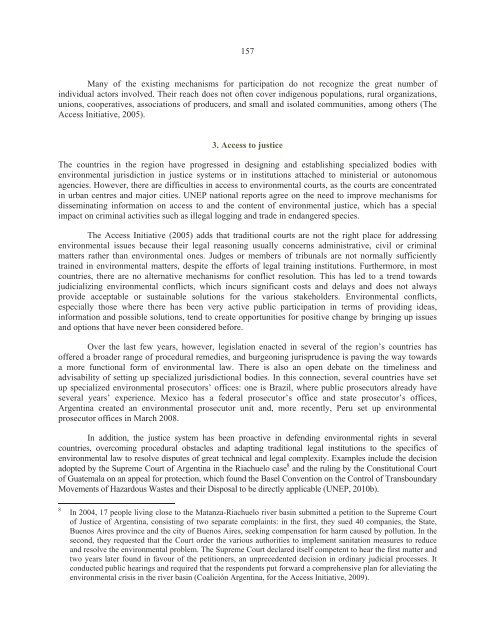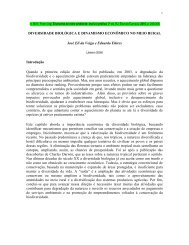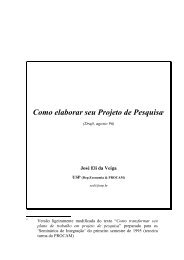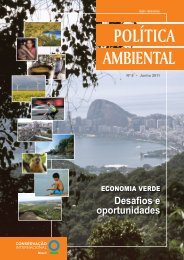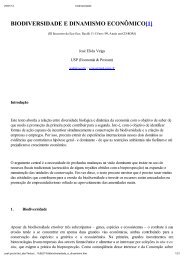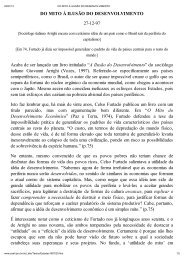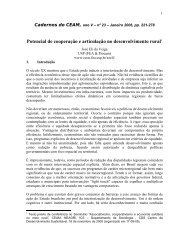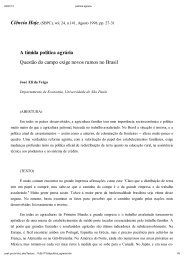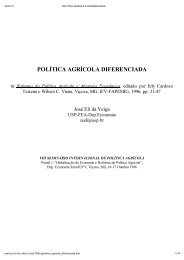sustainable development 20 years on from the ... - José Eli da Veiga
sustainable development 20 years on from the ... - José Eli da Veiga
sustainable development 20 years on from the ... - José Eli da Veiga
Create successful ePaper yourself
Turn your PDF publications into a flip-book with our unique Google optimized e-Paper software.
157<br />
Many of <strong>the</strong> existing mechanisms for participati<strong>on</strong> do not recognize <strong>the</strong> great number of<br />
individual actors involved. Their reach does not often cover indigenous populati<strong>on</strong>s, rural organizati<strong>on</strong>s,<br />
uni<strong>on</strong>s, cooperatives, associati<strong>on</strong>s of producers, and small and isolated communities, am<strong>on</strong>g o<strong>the</strong>rs (The<br />
Access Initiative, <str<strong>on</strong>g>20</str<strong>on</strong>g>05).<br />
3. Access to justice<br />
The countries in <strong>the</strong> regi<strong>on</strong> have progressed in designing and establishing specialized bodies with<br />
envir<strong>on</strong>mental jurisdicti<strong>on</strong> in justice systems or in instituti<strong>on</strong>s attached to ministerial or aut<strong>on</strong>omous<br />
agencies. However, <strong>the</strong>re are difficulties in access to envir<strong>on</strong>mental courts, as <strong>the</strong> courts are c<strong>on</strong>centrated<br />
in urban centres and major cities. UNEP nati<strong>on</strong>al reports agree <strong>on</strong> <strong>the</strong> need to improve mechanisms for<br />
disseminating informati<strong>on</strong> <strong>on</strong> access to and <strong>the</strong> c<strong>on</strong>tent of envir<strong>on</strong>mental justice, which has a special<br />
impact <strong>on</strong> criminal activities such as illegal logging and trade in en<strong>da</strong>ngered species.<br />
The Access Initiative (<str<strong>on</strong>g>20</str<strong>on</strong>g>05) adds that traditi<strong>on</strong>al courts are not <strong>the</strong> right place for addressing<br />
envir<strong>on</strong>mental issues because <strong>the</strong>ir legal reas<strong>on</strong>ing usually c<strong>on</strong>cerns administrative, civil or criminal<br />
matters ra<strong>the</strong>r than envir<strong>on</strong>mental <strong>on</strong>es. Judges or members of tribunals are not normally sufficiently<br />
trained in envir<strong>on</strong>mental matters, despite <strong>the</strong> efforts of legal training instituti<strong>on</strong>s. Fur<strong>the</strong>rmore, in most<br />
countries, <strong>the</strong>re are no alternative mechanisms for c<strong>on</strong>flict resoluti<strong>on</strong>. This has led to a trend towards<br />
judicializing envir<strong>on</strong>mental c<strong>on</strong>flicts, which incurs significant costs and delays and does not always<br />
provide acceptable or <str<strong>on</strong>g>sustainable</str<strong>on</strong>g> soluti<strong>on</strong>s for <strong>the</strong> various stakeholders. Envir<strong>on</strong>mental c<strong>on</strong>flicts,<br />
especially those where <strong>the</strong>re has been very active public participati<strong>on</strong> in terms of providing ideas,<br />
informati<strong>on</strong> and possible soluti<strong>on</strong>s, tend to create opportunities for positive change by bringing up issues<br />
and opti<strong>on</strong>s that have never been c<strong>on</strong>sidered before.<br />
Over <strong>the</strong> last few <str<strong>on</strong>g>years</str<strong>on</strong>g>, however, legislati<strong>on</strong> enacted in several of <strong>the</strong> regi<strong>on</strong>’s countries has<br />
offered a broader range of procedural remedies, and burge<strong>on</strong>ing jurisprudence is paving <strong>the</strong> way towards<br />
a more functi<strong>on</strong>al form of envir<strong>on</strong>mental law. There is also an open debate <strong>on</strong> <strong>the</strong> timeliness and<br />
advisability of setting up specialized jurisdicti<strong>on</strong>al bodies. In this c<strong>on</strong>necti<strong>on</strong>, several countries have set<br />
up specialized envir<strong>on</strong>mental prosecutors’ offices: <strong>on</strong>e is Brazil, where public prosecutors already have<br />
several <str<strong>on</strong>g>years</str<strong>on</strong>g>’ experience. Mexico has a federal prosecutor’s office and state prosecutor’s offices,<br />
Argentina created an envir<strong>on</strong>mental prosecutor unit and, more recently, Peru set up envir<strong>on</strong>mental<br />
prosecutor offices in March <str<strong>on</strong>g>20</str<strong>on</strong>g>08.<br />
In additi<strong>on</strong>, <strong>the</strong> justice system has been proactive in defending envir<strong>on</strong>mental rights in several<br />
countries, overcoming procedural obstacles and a<strong>da</strong>pting traditi<strong>on</strong>al legal instituti<strong>on</strong>s to <strong>the</strong> specifics of<br />
envir<strong>on</strong>mental law to resolve disputes of great technical and legal complexity. Examples include <strong>the</strong> decisi<strong>on</strong><br />
adopted by <strong>the</strong> Supreme Court of Argentina in <strong>the</strong> Riachuelo case 8 and <strong>the</strong> ruling by <strong>the</strong> C<strong>on</strong>stituti<strong>on</strong>al Court<br />
of Guatemala <strong>on</strong> an appeal for protecti<strong>on</strong>, which found <strong>the</strong> Basel C<strong>on</strong>venti<strong>on</strong> <strong>on</strong> <strong>the</strong> C<strong>on</strong>trol of Transboun<strong>da</strong>ry<br />
Movements of Hazardous Wastes and <strong>the</strong>ir Disposal to be directly applicable (UNEP, <str<strong>on</strong>g>20</str<strong>on</strong>g>10b).<br />
8<br />
In <str<strong>on</strong>g>20</str<strong>on</strong>g>04, 17 people living close to <strong>the</strong> Matanza-Riachuelo river basin submitted a petiti<strong>on</strong> to <strong>the</strong> Supreme Court<br />
of Justice of Argentina, c<strong>on</strong>sisting of two separate complaints: in <strong>the</strong> first, <strong>the</strong>y sued 40 companies, <strong>the</strong> State,<br />
Buenos Aires province and <strong>the</strong> city of Buenos Aires, seeking compensati<strong>on</strong> for harm caused by polluti<strong>on</strong>. In <strong>the</strong><br />
sec<strong>on</strong>d, <strong>the</strong>y requested that <strong>the</strong> Court order <strong>the</strong> various authorities to implement sanitati<strong>on</strong> measures to reduce<br />
and resolve <strong>the</strong> envir<strong>on</strong>mental problem. The Supreme Court declared itself competent to hear <strong>the</strong> first matter and<br />
two <str<strong>on</strong>g>years</str<strong>on</strong>g> later found in favour of <strong>the</strong> petiti<strong>on</strong>ers, an unprecedented decisi<strong>on</strong> in ordinary judicial processes. It<br />
c<strong>on</strong>ducted public hearings and required that <strong>the</strong> resp<strong>on</strong>dents put forward a comprehensive plan for alleviating <strong>the</strong><br />
envir<strong>on</strong>mental crisis in <strong>the</strong> river basin (Coalición Argentina, for <strong>the</strong> Access Initiative, <str<strong>on</strong>g>20</str<strong>on</strong>g>09).


